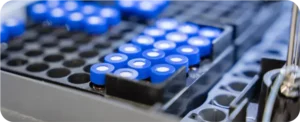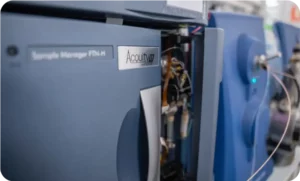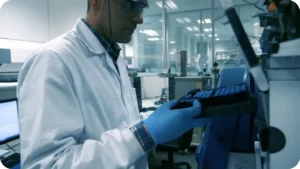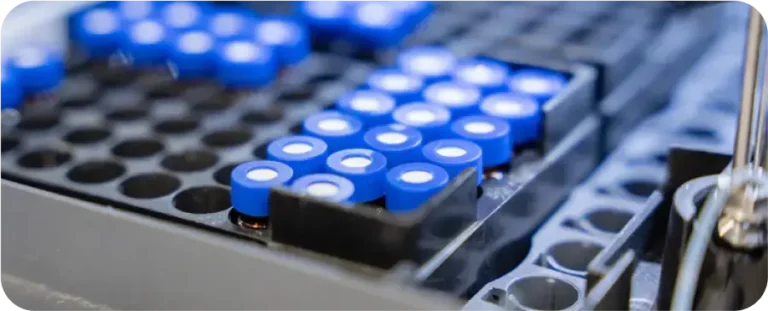The use of biologics has grown exponentially in the last decade, driven by advances in genetic engineering, a deeper understanding of disease mechanisms, and an increasing demand for targeted therapies with fewer side effects. These treatments, developed from living organisms, have expanded therapeutic options in fields such as oncology, immunology, and rare diseases. Their ability to act with high specificity has improved clinical outcomes and opened up new research lines, positioning biotechnology as a key driver of innovation in healthcare.
What Are Biologic Drugs? Definition and Distinctive Characteristics
Biopharmaceuticals are drugs derived from living organisms, such as cells, proteins, tissues, or nucleic acids. Unlike small-molecule drugs, produced through chemical synthesis, biologics present much more complex structures that require cutting-edge biotechnologies to be obtained.
Biologics encompasses a wide range of products, including monoclonal antibodies, recombinant proteins, modern vaccines, and growth factors, that allow specific and tailored interventions with fewer off-target effects than conventional drugs.
Manufacturing process
Biologics production is usually performed using cell cultures of mammals, bacteria, or yeast in a highly controlled process whose main steps are:
- Expression: Genetic engineering of the host cells to express the target protein.
- Fermentation: Cultivation of engineered cells in bioreactors to maximize yield.
- Purification: Isolation of the desired protein and removal of contaminants.
- Formulation: Preparation of the purified protein for its clinical use, ensuring its stability.
Compared to conventional drugs, biologics are inherently sensitive to environmental changes and contamination, leading to batch-to-batch variability and compromised stability. This makes rigorous quality control in biotechnology essential to ensure consistent safety and efficacy.
Key Analytical Methods for Biologics Quality Testing
Robust quality control in biotechnology is essential throughout the entire biologics manufacturing process to ensure safety, consistency, and regulatory compliance. This includes:
- Evaluation of raw materials and cell lines: Techniques such as PCR, STR, and ICP-MS confirm identity, genetic stability, and trace-level contaminants in cell banks and reagents.
- In-process controls: Monitoring Critical Process Parameters (CPPs), such as pH, dissolved oxygen concentration, or cell viability, ensures consistency and minimizes variability.
- Final product testing involves five key aspects:
-
- Identity verification: Often verified using techniques like mass spectrometry (MS) or High-Performance Liquid Chromatography (HPLC).
-
- Purity: Residual impurities are usually measured using HPLC, ELISA, and electrophoresis.
-
- Potency: The biological activity of the product is typically evaluated using cell-based assays.
-
- Sterility: Ensured via compendial methods, PCR, or rapid microbiological testing.
-
- Stability: Evaluated under specific storage conditions, using HPLC, UV/Vis, or FTIR.

Together, these methods provide the foundation for effective biologics quality control, ensuring Good Manufacturing Practices (GMP) compliance, regulatory approval, and reliable product performance across the product lifecycle.
Why Quality Control in the Biologics Manufacturing Process Is Critical? High-Performance Liquid Chromatography-Mass Spectrometry
The biologics manufacturing process involves cell-based systems, which are sensitive to even minor environmental changes due to their biological complexity. This makes robust pharmaceutical quality assurance essential.
In this context, HPLC coupled with tandem mass spectrometry (HPLC-MS/MS) emerged as a key technique due to:
- High sensitivity and specificity to detect impurities and post-translational modifications.
- Accurate quantification of active pharmaceutical ingredients in complex matrices.
- Reduced analysis time and interference, enabling faster decision-making.
The adoption of HPLC-MS/MS in biologics quality control workflows aligns with GMP and US Food and Drug Administration (FDA) regulations and supports validation in pharmaceutical quality assurance.

Regulatory guidelines for quality control in biotechnology
Global regulatory entities, including the FDA, European Medicines Agency (EMA), and the International Council for Harmonisation (ICH), have defined comprehensive frameworks to guide quality control in the biotech process.
Key documents, such as ICH Q6B Guideline for Test Procedures and Acceptance Criteria for Biotechnological/Biological Products, or the FDA Bioanalytical Method Validation guidance, ensure that all biologic drugs meet rigorous standards. These frameworks, along with GMP compliance, are not only a regulatory requirement but also the key to effective pharmaceutical quality assurance.
Analytical Support for Pre-GMP Stages in Biologics Manufacturing: Choosing the Right Quality Control Partner
Before full GMP compliance, early biologics development relies on tailored analytical support. Activities such as impurity profiling, formulation screening, and preliminary stability studies demand robust yet flexible methods.
An effective quality control specialist biotech partner should offer:
- Proven expertise in biologics and complex matrice
- Adaptable analytical platforms with GMP-ready capabilitie
- Ability to scale with your timelines and support regulatory submissions
- Experience in regulatory guidance
The right quality control partner enhances data reliability, accelerates decision-making, and reduces risk, laying the foundation for a smooth transition to GMP stages.

In today’s demanding landscape, rigorous biologics quality control is essential to ensure safety and efficacy. Advanced technologies like HPLC-MS/MS drive precision, while ongoing innovation strengthens compliance and biotechnological performance.
AMSbiopharma provides end-to-end analytical solutions for each step of the biologics development process, from early formulation to final quality control testing.
Contact us to ensure your products meet the highest international standards.
References
U.S. Food and Drug Administration. What are “Biologics” Questions and Answers. Silver Spring, MD: FDA; 2018 Feb 6 [cited 2025 May 12]. Available from: https://www.fda.gov/about-fda/center-biologics-evaluation-and-research-cber/what-are-biologics-questions-and-answers
McGonigle P. How Biologics Have Changed the Drug Discovery Landscape. Annu Rev Pharmacol Toxicol. 2025 Jan;65(1):29-46. doi: Garnick RL, Solli NJ, Papa PA. The role of quality control in biotechnology: an analytical perspective. Anal Chem. 1988 Dec 1;60(23):2546-57. doi: 10.1021/ac00174a004
World Health Organization. WHO good manufacturing practices for biological products: Annex 2, WHO Technical Report Series No. 999 [Internet]. 2016 [cited 2025 May 2]. Available from: https://www.who.int/docs/default-source/biologicals/gmp/annex-2-who-good-manufacturing-practices-for-biological-products.pdf
Tassi M, De Vos J, Chatterjee S, Sobott F, Bones J, Eeltink S. Advances in native high-performance liquid chromatography and intact mass spectrometry for the characterization of biopharmaceutical products. J Sep Sci. 2018 Jan;41(1):125-144. doi: 10.1002/jssc.201700988
European Medicines Agency. Scientific guidelines: Biological guidelines [Internet]. Amsterdam: EMA; [cited 2025 May 12]. Available from: https://www.ema.europa.eu/en/human-regulatory-overview/research-and-development/scientific-guidelines/biological-guidelines
International Council for Harmonisation of Technical Requirements for Pharmaceuticals for Human Use. ICH Harmonised Tripartite Guideline: Specifications—Test Procedures and Acceptance Criteria for Biotechnological/Biological Products Q6B [Internet]. 1999 Mar 10 [cited 2025 May 12]. Available from: https://database.ich.org/sites/default/files/Q6B%20Guideline.pdf
U.S. Food and Drug Administration. Guidance for Industry: Q6B Specifications—Test Procedures and Acceptance Criteria for Biotechnological/Biological Products [Internet]. Silver Spring (MD): FDA; 1999 [cited 2025 May 13]. Available from: https://www.fda.gov/media/70858/download


